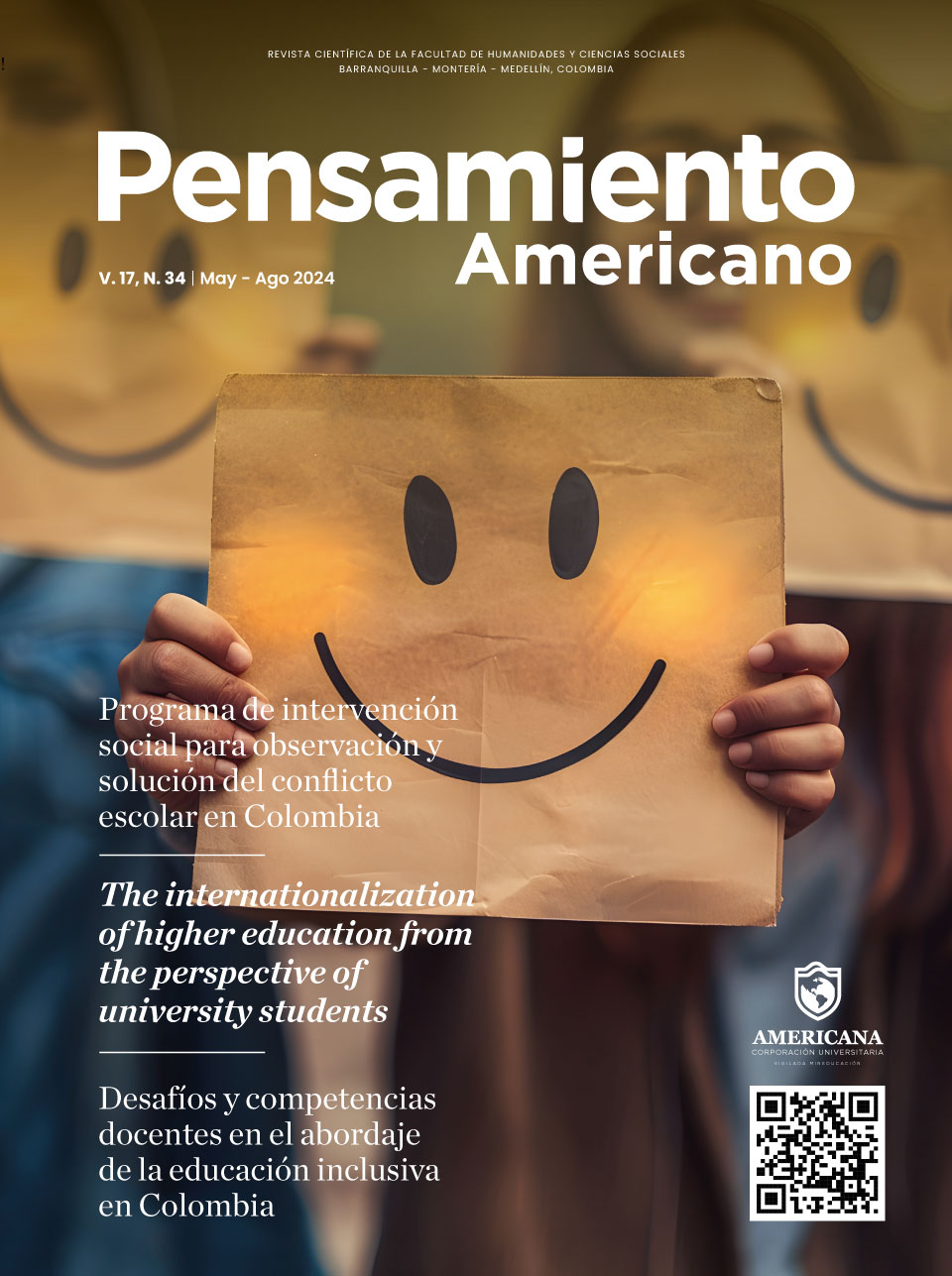Effectiveness of Sentencia T-622/16 and biocultural rights
DOI:
https://doi.org/10.21803/penamer.17.34.661Keywords:
Biocultural Rights, Communities, Riverside Set, SustainabilityAbstract
Introduction: Effectiveness of the Colombian state, institutions and communities in the defense, promotion and guarantee of the biocultural rights of the populations located around the Atrato River, according to the rulings of the constitutional court in ruling
Sentencia T-622/16. Objective: This article was prepared with the purpose of examining the effectiveness of ruling Sentencia T-622/16 and sustainability of the biocultural rights of the Afro-Colombian communities of Chocó, and the influence on the living conditions
of the riverine communities. Methodology: The qualitative method was chosen as the study perspective, with respect to the materialization of ruling Sentencia T-622/16 and for its preparation, ethnographic studies, interviews with members of the community and joint bodies of guardians of the Atrato River were carried out. Results: Based on the study carried out and, it is inferred that the orders of the constitutional court in order to
guarantee the protection of biocultural rights and preservation of the Atrato River have not had real consequences in the practical life of these ethnic communities. Conclusions: To conclude, state abandonment and institutional ineffectiveness threaten the sustainability of the biocultural rights of the community residents of the department of Chocó and
impact their quality of life.
Downloads
References
CONGRESO DE LA REPÚBLICA. Constitución Política de Colombia. (4, Julio, 1991) Bogotá D.C., 1991.
CORTE CONSTITUCIONAL, Sentencia T -622, Derechos Bioculturales de las comunidades Negras, M.P. Jorge Iván Palacio. Bogotá D.C., 2016.
Organización Internacional del Trabajo. (1989). Convenio sobre Pueblos Indígenas y Tribales en Países Independientes, 1989 (núm. 169). Recuperado de https://www.ilo.org/wcmsp5/groups/public/---Américas/---ro-lima/documents/publication/wcms_345065.pdf
Clavijo Gallego, T. (2016). El reconocimiento étnico-territorial de comunidades negras en Colombia: ¿un lugar de derecho? Nova et Bétera (24), 7-19. https://dialnet.unirioja.es/servlet/articulo?codigo=6481667
LARA RODRÍGUEZ, Juan Sebastián, TOSI FURTADO, André y ALTIMIRAS MARTIN, Aleix, Minería del platino y el oro en Chocó: pobreza, riqueza natural e LUQUE PÉREZ, Santiago y PUENTES ESPINOSA, Pilar. Paz y Seguridad: Bajo Atrato, un conflicto que se Perpetúa. Diciembre 2022.
Llinás, F. “La enfermedad de Colombia es su debilidad institucional. El marco institucional colombiano no incentiva la eficiencia económica y la equidad social”, Portafolio, 13 de enero de 2012, disponible en [https://www.portafolio.co/opinion/redaccionportafolio/enfermedad-colombia-debilidad-institucional-100168].
Guzmán Jiménez, L. F. (2022). Análisis de la efectividad y sostenibilidad de la Sentencia T-622/16: ¿sentencia estructural dialógica? Revista IUS,. Recuperado de https://www.scielo.org.mx/scielo.php?script=sci_arttext&pid=S1870-21472022000100213
Amaya Arias, Á. M., Andino, M. M., Celume Byrne, T., & García Pachón, M. P. (2020). Reconocimiento de la naturaleza y de sus componentes como sujetos de derechos. Universidad Externado de Colombia. https://bdigital.uexternado.edu.co/server/api/core/bitstreams/655df84e-c895-471b-bce7-80502ec26c23/content
Comité de Seguimiento. (2020). Quinto Informe de Seguimiento Sentencia T-622 de 2016. Laura Tatiana Obando Olaya (Ed.). Página 19. http://biblioteca.udea.edu.co:8080/leo/bitstream/123456789/6337/1/ComitedeSeguimiento_2016_QuintoInformeSeguimiento.pdf
Corporación Autónoma Regional para el Desarrollo Sostenible del Chocó (Codechoco). (2020). Plan de Acción Institucional Oportunidad y Desarrollo Sostenible para las Subregiones 2020-2023. https://codechoco.gov.co/loader.php?lServicio=Tools2&lTipo=viewpdf&id=368
Peña Chacón, Mario. "La revolución de los derechos humanos ambientales y de los derechos de la naturaleza." Diario Ambiental Nro. 200, 31 May 2018, p. 3. https://dpicuantico.com/sitio/wp-content/uploads/2018/05/Chac%C3%B3n-Ambiental-31.5.pdf
Echavarría-Rentería, Y. L. he Hinestroza-Cuesta, L. (2021). Judicialización de los conflictos ambientales en el Chocó: ríos de mercurio. Revista IUSTA, (55). https://doi.org/10.15332/25005286.6852
Mallorquín Tovar, A.R. (2022). Deforestación y minería ilegal: Una mirada a los mecanismos dirigidos a la protección del medio ambiente en Colombia, a partir de la expedición de la sentencia T-622 de 2016. Universidad La Gran Colombia. p. 22. https://repository.ugc.edu.co/bitstream/handle/11396/7431/Mayorquin_Tovar_Angelica_Rocio_Moreno_Carvajal_Maria_Angelica_2022.pdf?sequence=1&isAllowed=y
Sarmiento Erazo, J.P., Llorente, L.M., & Martínez Hernández, L. (2022). Conexidad prospectiva: del estado de cosas inconstitucional a los ecosistemas como sujetos de derecho - aportes desde la experiencia colombiana. Revista Scielo5. Recuperado de Sarmiento Erazo, J.P., Llorente, L.M., & Martínez Hernández, L. (2022). https://www.scielo.br/j/rinc/a/nqrdmqYP5bvxNn5bNCZBvzC/?format=html&lang=es#ModalTutors.
Downloads
Published
Versions
- 2024-08-06 (2)
- 2024-06-24 (1)
Issue
Section
License
Copyright (c) 2024 Pensamiento Americano

This work is licensed under a Creative Commons Attribution-NonCommercial-NoDerivatives 4.0 International License.
The author or authors of an article accepted for publication in the Journal Pensamiento Americano will transfer all of the patrimonial rights to the American University Corporation free of charge, within which are included: the right to edit, publish, reproduce and distribute both print media as digital, in addition to include in article in international indexes and / or databases, likewise, the Editorial Seal is authorized to use the images, tables and / or any graphic material presented in the article for the design of covers or posters from the same magazine. By assuming the patrimonial rights of the article, it may not be partially or totally reproduced in any printed or digital media without its express permission.
AUTHORITY ASPECTS
For the Pensamiento Americano Journal, all the authors of an article have made substantial contributions to the research and the manuscript, and they share the responsibility when the article presents errors, fraud in some way or violations of copyright.
After submitting an article, the journal does not accept the addition, deletion or change in the order of the authors, in addition we reserve the right to release the article when it has been submitted to the journal and under no circumstances will American Thought accept the article. withdrawal of an article during any phase of the editorial process






